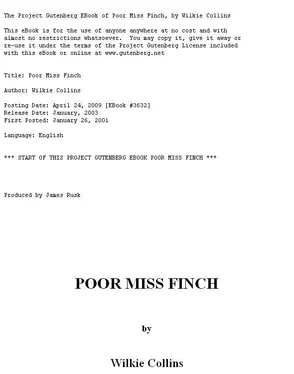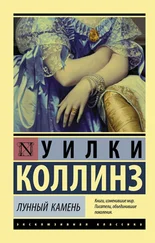Уилки Коллинз - Poor Miss Finch
Здесь есть возможность читать онлайн «Уилки Коллинз - Poor Miss Finch» весь текст электронной книги совершенно бесплатно (целиком полную версию без сокращений). В некоторых случаях можно слушать аудио, скачать через торрент в формате fb2 и присутствует краткое содержание. Год выпуска: 2002, Жанр: Классическая проза, на английском языке. Описание произведения, (предисловие) а так же отзывы посетителей доступны на портале библиотеки ЛибКат.
- Название:Poor Miss Finch
- Автор:
- Жанр:
- Год:2002
- ISBN:нет данных
- Рейтинг книги:3 / 5. Голосов: 1
-
Избранное:Добавить в избранное
- Отзывы:
-
Ваша оценка:
- 60
- 1
- 2
- 3
- 4
- 5
Poor Miss Finch: краткое содержание, описание и аннотация
Предлагаем к чтению аннотацию, описание, краткое содержание или предисловие (зависит от того, что написал сам автор книги «Poor Miss Finch»). Если вы не нашли необходимую информацию о книге — напишите в комментариях, мы постараемся отыскать её.
Poor Miss Finch — читать онлайн бесплатно полную книгу (весь текст) целиком
Ниже представлен текст книги, разбитый по страницам. Система сохранения места последней прочитанной страницы, позволяет с удобством читать онлайн бесплатно книгу «Poor Miss Finch», без необходимости каждый раз заново искать на чём Вы остановились. Поставьте закладку, и сможете в любой момент перейти на страницу, на которой закончили чтение.
Интервал:
Закладка:
The note was expressed in these strange words:—"I cannot receive you here; but I can, and will, come to you at your hotel if you will wait for me. I am not able to appoint a time. I can only promise to watch for my first opportunity, and to take advantage of it instantly—for your sake and for mine."
But one interpretation could be placed on such language as this. Lucilla was not a free agent. Both Oscar and the rector were now obliged to acknowledge that my view of the case had been the correct one. If it was impossible for me to be received into the house, how doubly impossible would it be for the men to gain admission! Oscar, after reading the note, withdrew to the further end of the room; keeping his thoughts to himself. Mr. Finch decided on stepping out of his secondary position by forthwith taking a course of his own.
"Am I to infer," he began, "that it is really useless for me to attempt to see my own child?"
"Her letter speaks for itself," I replied. "If you attempt to see her, you will probably be the means of preventing your daughter from coming here."
"In my parental capacity," continued Mr. Finch, "it is impossible for me to remain passive. As a brother-clergyman, I have, I conceive, a claim on the rector of the parish. It is quite likely that notice may have been already given of this fraudulent marriage. In that case, it is not only my duty to myself and my child—it is my duty to the Church, to confer with my reverend colleague. I go to confer with him." He strutted to the door, and added, "If Lucilla arrives in my absence, I invest you with my authority, Madame Pratolungo, to detain her until my return." With that parting charge to me, he walked out.
I looked at Oscar. He came slowly towards me from the other end of the room.
"You will wait here, of course?" he said.
"Of course. And you?"
"I shall go out for a little while."
"For any particular purpose?"
"No. To get through the time. I am weary of waiting."
I felt positively assured, from the manner in which he answered me, that he was going—now he had got rid of Mr. Finch—straight to his cousin's house.
"You forget," I said, "that Lucilla may come here while you are out. Your presence in the room, or in the room next to this, may be of the greatest importance, when I tell her what your brother has done. Suppose she refuses to believe me? What am I to do if I have not got you to appeal to? In your own interests, as well as in Lucilla's, I request you to remain here with me till she comes."
Putting it on that ground only, I waited to see what he would do. After a certain hesitation, he answered with a sullen assumption of indifference, "Just as you please!"—and walked away again towards the other end of the room. As he turned his back on me, I heard him say to himself, "It's only waiting a little longer!"
"Waiting for what?" I asked.
He looked round at me over his shoulder.
"Patience for the present!" he answered. "You will hear soon enough." For the moment, I said no more to him. The tone in which he had replied warned me that it would be useless.
After an interval—how long an interval I cannot well say—I heard the sound of women's dresses in the passage outside.
The instant after, there was a knock at the door.
I signed to Oscar to open a second door, close by him at the lower end of the room, and (for the moment at least) to keep out of sight. Then I answered the knock, and said as steadily as I could, "Come in."
A woman unknown to me entered, dressed like a respectable servant. She came in leading Lucilla by the hand. My first look at my darling told me the horrible truth. As I had seen her in the corridor at the rectory on the first day we met, so I now saw her once more. Again, the sightless eyes turned on me, insensibly reflecting the light that fell on them. Blind! Oh, God, after a few brief weeks of sight, blind again!
In that miserable discovery, I forgot everything else. I flew to her, and caught her in my arms. I cast one look at her pale, wasted face—and burst out crying on her bosom.
She held my head gently with one hand, and waited with the patience of an angel until that first outbreak of my grief had exhausted itself. "Don't cry about my blindness," said the soft, sweet voice that I knew so well. "The days when I had my sight have been the unhappiest days of my life. If I look as if I had been fretting, don't think it is about my eyes." She paused, and sighed bitterly. "I may tell you, " she went on in a whisper. "It's a relief, it's a consolation, to tell you. I am fretting about my marriage."
Those words roused me. I lifted my head, and kissed her. "I have come back to comfort you," I said: "and I have behaved like a fool."
She smiled faintly. "How like you," she exclaimed, "to say that!" She tapped my cheek with her fingers in the old familiar way. The repetition of that little trifling action almost broke my heart. I nearly choked myself in forcing back the stupid cowardly useless tears that tried to burst from me again. "Come!" she said. "No more crying! Let us sit down and talk as if we were at Dimchurch."
I took her to the sofa: we sat side by side. She put her arm round my waist, and laid her head on my shoulder. Again the faint smile flickered like a dying light on her lovely face; wan and wasted, yet still beautiful—still the Virgin's face in Raphael's picture. "We are a strange pair," she said, with a momentary flash of her old irresistible humour. "You are my bitterest enemy, and you burst out crying over me the moment we meet. I have been shockingly treated by you—and I have got my arm round your waist and my head on your shoulder, and I wouldn't let go of you for the world!" Her face saddened again; her voice suddenly altered its tone. "Tell me," she went on, "how is it that appearances were so terribly against you? Oscar satisfied me, at Ramsgate, that I ought to give you up, that I ought never to see you again. I took his view—there is no denying it, my dear—I agreed with him in detesting you, for a little while. But, when the blindness came back, I could keep it up no longer. Little by little, as the light died out, my heart would turn to you again. When I heard your letter read, when I knew that you were near me—it was just like the old times; I was mad to see you. And here I am—satisfied, before you explain it to me, that you have been the victim of some terrible mistake."
I tried, in grateful acknowledgment of those generous words, to enter on my justification there and then. It was impossible. I could think of nothing, I could speak of nothing, but the dreadful discovery of her blindness.
"Give me a few minutes," I said, "and you shall hear it all. I can't talk of myself, yet—I can only talk of you. Oh, Lucilla, why did you keep away from Grosse? Come with me to him to-day. Let him try what he can do. At once, my love—before it is too late!"
"It is too late," she said. "I have been to another oculist—a stranger. He said, what Mr. Sebright said: he doubted if there was ever any chance for me: he thought the operation ought never to have been performed."
"Why did you go to a stranger?" I asked. "Why did you give up Grosse!"
"You must ask Oscar," she answered. "It was at his desire that I kept away from Grosse."
Hearing this, I penetrated for myself the motive which had actuated Nugent—as I afterwards found it indicated in the Journal. If he had let Lucilla go to Grosse, our good German might have noticed that her position was preying on her mind, and might have seen his reasons for exposing the deception that Nugent was practicing on her. For the rest, I still persisted in entreating Lucilla to go back with me to our old friend.
"Remember our conversation on this very subject," she rejoined, shaking her head decisively. "I mean at the time when the operation was going to be performed. I told you I was used to being blind. I said I only wanted to recover my sight, to see Oscar. And when I did see him—what happened? The disappointment was so dreadful, I wished myself blind again. Don't start! don't cry out as if you were shocked! I mean what I say. You people who can see, attach such an absurd importance to your eyes! Don't you recollect my saying that, when we last talked about it?"
Читать дальшеИнтервал:
Закладка:
Похожие книги на «Poor Miss Finch»
Представляем Вашему вниманию похожие книги на «Poor Miss Finch» списком для выбора. Мы отобрали схожую по названию и смыслу литературу в надежде предоставить читателям больше вариантов отыскать новые, интересные, ещё непрочитанные произведения.
Обсуждение, отзывы о книге «Poor Miss Finch» и просто собственные мнения читателей. Оставьте ваши комментарии, напишите, что Вы думаете о произведении, его смысле или главных героях. Укажите что конкретно понравилось, а что нет, и почему Вы так считаете.






